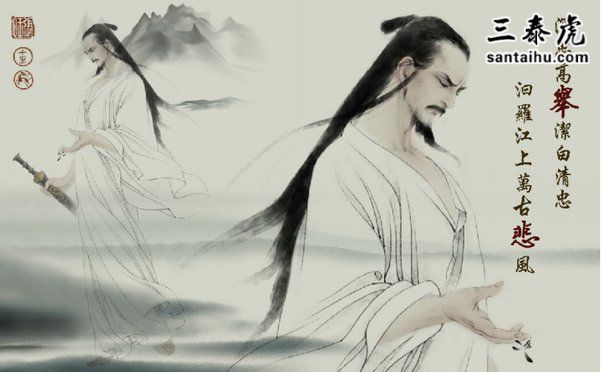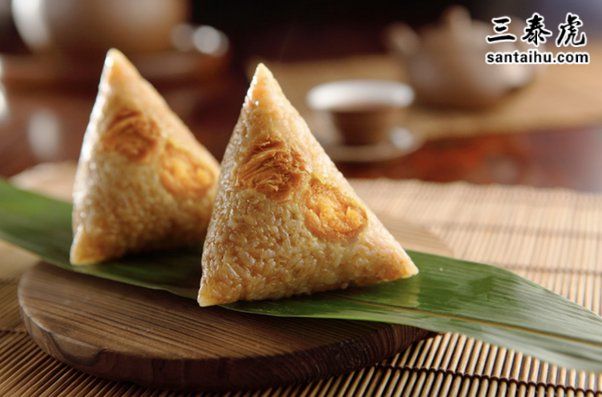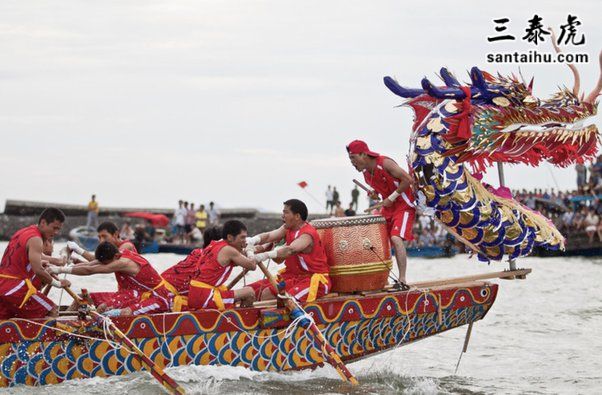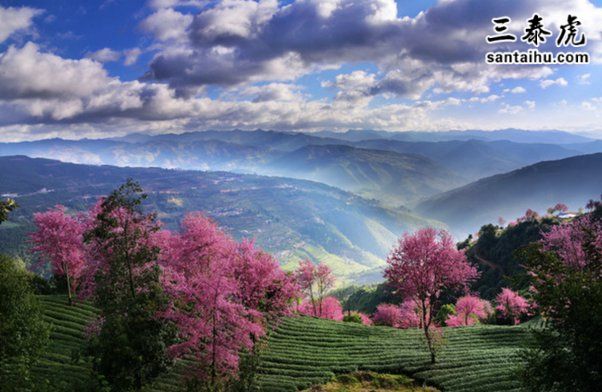Why did South Korea register the Duanwu Festival as its own cultural heritage? My Chinese wife told me they belong to China.
韩国为什么要把端午节登记为韩国的文化遗产?端午节是中国的节日啊。
以下是Quora网友的评论:
Richy T
This only proves that Korean culture derived from Chinese culture.
If you are not convinced, just take a look at the Chinese history timeline.
这只能证明韩国文化起源于中国文化。
如果你不信,看看中国的历史时间轴就知道了。
Jamie Wang
Although Duanwu is originally from China, Korea actually developed its own version of it.
Chinese version is about to commemorate the great politician and poet called Qu Yuan, who lived in 3rd century BC and contribute a lot to his country, and drowned himself in a river after his country was conquered.
虽然端午节起源于中国,但在韩国演变出了自己的特色。
中国的端午节是为了纪念生活在公元前3世纪的伟大政治家和诗人屈原,他为自己的国家呕心沥血,但最终没能抵挡敌国的征服,于是他万念俱灰,投河自尽。

Above is a modern drawing of Qu Yuan. I think it’s easier for people to accept.
The main activities during Chinese Duanwu are eating Zongzi, rowing loong (Dragon) boat, and climbing hills.
Zongzi as in the picture below, is a handful of sticky rice with various ingredients rolling in leaves. It can be salty, sweet or no seasoning but with sugar as dip. The most common Zongzi is shaped as in the picture, triangle like. But it also has other form with different shapes and leaves.
上图是屈原的现代画像。我认为这张画像更容易被人们接受。
中国端午节的主要习俗是吃粽子、划龙船和爬山。
如下图所示,粽子就是将一把糯米加上各种食材裹在叶子里,可以是咸的、甜的,也可以不加调料,只蘸糖吃。最常见的粽子的形状如图所示,像个三角形,但也有其他不同的形状,用不同的叶子。

中国端午节的主要习俗是吃粽子、划龙船和爬山。
如下图所示,粽子就是将一把糯米加上各种食材裹在叶子里,可以是咸的、甜的,也可以不加调料,只蘸糖吃。最常见的粽子的形状如图所示,像个三角形,但也有其他不同的形状,用不同的叶子。
There is a legend behind Zongzi. After Qu Yuan died, the local people packed lots of sticky rice and throw them into the river to feed the fishes so that they won't hurt Qu Yuan’s body.
关于粽子还有一个传说。屈原死后,当地人把大量的糯米打包,扔进河里喂鱼,这样鱼就不会啃食屈原的身体。
Another tradition is rowing boat. This tradition is actually older than Qu Yuan. But the legend say that after he died, local fishermen tried to salvage his corpse, but lost trace at the Dongting lake. Ever since that, people rowing their boats in the river and lake in the same day he died to commemorate him. Now it has become a quite nice sport.

另一个传统习俗是划龙舟。这项传统活动其实是在屈原投江前就存在的。但传说屈原投江后,当地渔民试图打捞他的尸体,但在洞庭湖失去了踪迹。从那以后,人们就在屈原投江的那一天到河里和湖里划船纪念屈原。现在划龙舟已成为一项相当不错的运动。
As for climbing hills, its purely because the whether is usually nice in the 5th May of lunar calendar. Climbing up hills and overlook the nice views is simply a nice activity for families.

至于爬山,纯粹是因为农历五月初五的天气通常很好。爬到山顶俯瞰美丽的景色是一项很好的家庭活动。
I am not familiar with the Korean version. But according to the online sources, its main purpose is about local god. The ritual is far more complicated and the how ceremony is significantly longer than the Chinese version.
Your wife is wrong about one thing: Duanwu was originated in China, and was spread to surrounding countries along with Chinese culture.
我不太熟悉韩国的端午节。但根据网上的资料,韩国的端午节主要是为了供奉当地的神,仪式要复杂得多,仪式时间也比中国端午节要长得多。
你妻子有一点说的不对:端午起源于中国,并伴随着中国文化传播到了周边各国。
Koreans used to use Chinese characters as the written form of Korean language. So their Duanwu also has a Chinese name, which is 端午祭. But in China, it’s 端午节. The difference is that Duanwu is a ceremony in Korea, and a holiday in China.
端午祭 is without any doubt a Korean cultural heritage. But it does share a lot of features with Chinese culture, because it’s originated from China.
历史上韩国人曾一度使用汉字作为韩语的书写形式。所以他们的端午节也有一个中文名字,叫做端午祭。但在中国则是端午节。两者的不同之处在于端午节在韩国是一种仪式典礼,而在中国则是一个假日。
端午祭确实算是韩国的文化遗产。但也确实和中国文化有很多共同点,毕竟它起源于中国。
Joseph Park
Koreans used to celebrate a holiday called Suritnal on the same day as the Chinese Duanwu festival. During the Joseon dynasty the Korean court had tremendous respect for Chinese customs. Chinese philosophers and heroes were held in high regard in Korea, so the Joseon court decided to change the name of Suritnal to Dano in honor of the Guyuan, the virtuous minister that the Chinese Duanwu festival celebrates. Celebrations are totally different however, the Korean men wrestle and the women do a swing competition. No dragon boat like China.
韩国人过去会在中国端午节当天庆祝一个叫做江陵端午祭的节日。朝鲜王朝时期,朝鲜朝廷非常尊重中国的习俗。中国思想家和英雄在朝鲜地位很高,因此朝鲜朝廷为了致敬中国端午节所纪念的品格高尚的大臣“屈原”,决定将“江陵端午祭”的名字改为“端午节”。但两国的庆祝活动完全不同,韩国会举办男子摔跤和女子荡秋千比赛,但没有中国的划龙舟。
Dong-Yoon Lee
The Gangneung Dano Festival is the representative festival in Korea.
Let's talk about the name first.
East Asian rice-growing countries have a long festival in spring and autumn.
For Korea, Dano serves as a general noun to represent the spring festival. Chuseok serves as a common noun to represent autumn’s one.
As many of you know, one of Korean dynasties Joseon was culturally subordinated to China.
江陵端午节是韩国代表性的节日。
我们先谈谈名字吧。
东亚产稻国家在春秋两季都有一个持续时间很长的节日。
在韩国,端午一般就代表着春节。仲秋一般代表着秋天。
很多人都知道,历史上的朝鲜王朝曾在文化上隶属于中国。
After the end of Goryeo, the founder of the new dynasty Joseon, Lee Seong-gye insisted that Korean should raise the level of culture for the eternal safety, and chose to adopt Confucianism in full-scale because China was the only great country that they could encounter geographically and it’s culture was Confucian culture.
高丽王朝灭亡后,新的朝鲜王朝的缔造者李成桂坚持认为,为了长久的和平,韩国人应该提高文化水平,他选择全面接受儒家思想,因为中国是他们在地理上唯一可以接壤的大国,而中国的文化是儒家文化。
However, the local aristocracy with its own consciousness demanded various devices to prevent it from diluting and disappearing its national identity.
The king who had the greatest sympathy for him was King Sejong, the fourth kings. He created Hangul the Korean unique spoken language notion system.
However, Confucian priests who held the bureaucracy disdained and hated Hangeul for various reasons.
但是有自己想法的地方贵族阶层要求采取各种手段保护自己的民族认同感不被弱化,不被取代。
第4代国王世宗创造了韩国特有的口语体系——韩文。
但是,把持着官场的儒生们出于种种原因对韩文不屑一顾。
After a long time, Japan strengthened Korean’s own sense of identity through stimulation, and Hangul became the only standard notation system. From that time, Koreans began to recall their own identity.
在很长一段时间后,日本的侵略激起了韩国人的民族认同感,韩文成为唯一的标准符号系统。从那时起,韩国人开始重拾自己的文化。
Originally, Gangneung Danoje is a unique festival in the Korean peninsula that has been recorded for only 1,000 years.
It originally may have a different name, and I guess it started to become have its name as ‘Dano’ during the Joseon Dynasty.
At the time of enrollment in UNESCO, this name was so customary that it was the name of the festival.
最初,江陵端日祭是朝鲜半岛上有历史记载的仅有1000年历史的独特节日。
它最早可能不是这个名字,我猜是在朝鲜王朝才开始称为“端午节”的。
韩国在联合国教科文组织申请登记的时候,我们早已习惯这个节日的名字了。
Assuming this is true, I would like to say that I am sorry to the Chinese people.
It's the same as when a certain area in China called their fermented food as kimchi and then applied for cultural heritage or called Arirang for the song.
However, if the reversal of Korea's own identity was not driven by the Japanese occupation, there would have been more such cases.
假设这是真的,我想对中国人民说声对不起。
这和中国某个地区把自己的发酵食品称为泡菜,然后申请文化遗产,或把歌曲起名阿里郎是一样的。
但是,如果不是日本的占领导致了韩国对自身文化认同的重视,这种事只会比现在更多。
Now I want to talk about how the contents of Gangneung Danoje is different from Chinese Dano.
The Gangneung Danoje was not known nationwide well until the 1990s.
After Kim Dae Jung, a de ocratization activist, became president, he started a municipal government.
现在我想谈谈江陵端午的内容和中国端午有什么不同。
直到20世纪90年代,江陵端午祭才在全国普及开来。
运动家金大中当选总统后,他成立了地方自治政府。
Korea has been a strong centralized state since the Joseon Dynasty. The people obey only the central government, which weakened the ability and will of the individual's subjective judgment and weakened the criticism of the irrational system.
Kim Dae Jung believes that the true de ocracy should be considered as the local owner and operator of the local people, and that the local government, which is the miniature of the central government, should be active.
自朝鲜时代以来,韩国一直是中央国家。人民只服从韩国中央政府,削弱了个人主观判断的能力和意志,也压制了对不合理制度的批判。
金大中认为,真正的民 主政体应该是地方的主人和地方人民的管理者,作为韩国中央政府微缩版的地方政府应该积极发挥作用。
I think that it is necessary to provide opportunities to have affection for local culture.
So he built a system to supply the central government 's budget to the local culture which was in danger of disappearing and disappearing by some elderly people.
As a result, many local customs became known nationwide, and the Gangneung Dano Festival is one of them.
我认为,为当地文化赢得民心提供机会是十分必要的做法。
所以他建立了一个制度,中央政 府为濒临失传的本土文化提供预算拨款。
因此,许多地方民俗活动开始在全国范围内普及,江陵端午祭就是其中之一。
Among the festivals revived, the most mysterious was Gangneung Danoje. First of all I want to point out that many Koreans still do not know well about Danoje. I also did not know it at the time of the Dano controversy and only recently it was worth it.
所有这些再现活力的节日中,最神秘的就是江陵端午祭。首先,我想说很多韩国人至今不太端午祭。在端午节争议刚出现的时候,我也并不了解,最近才开始为人所知。
Brandon Back
Before answering the question… Whenever these kinds of issues emerge, a lot of Chinese people say that Korea tries to steal their properties. And others blindly believe it.
Contrary to their belief, most Koreans know that a lot of Korean traditions originate from China. Nor we claim we invented them.
在回答这个问题之前我想先说一下…每次出现此类问题时,很多中国人都说韩国企图窃取中国的文化瑰宝。其他人就盲目相信了。
和这些中国人的想法恰好相反,大多数韩国人都知道韩国的很多传统起源于中国。我们也不会宣称是韩国人发明了这些东西。
It’s the same with Duanwu. most Koreans with a fair amount of educations know that celebrating Duanwu(Dan-O in Korean) originally came from China. Or at least it is related to Chinese Lunar Calendar.
But there is a distinctive difference between Chinese Duanwu and Korean Dan-O.
端午节也是如此。大多数受过一定教育的韩国人都知道庆祝端午的习俗(韩语中的Dan-O)最初源自中国,或者至少和中国农历有关。
但中国的端午节和韩国的端午节是截然不同的。
Chinese Duanwu day is to honor Quyuan, a famous politician/poet in ancient China.
In Korea. Dan-O day is mostly forgotten to Koreans. Actually, it hasn’t been a celebration day of any significance for most Koreans, except for those in a certain locale - Gangnung.
Korea didn’t registered Dan-O day as our unique heritage, but Gangnung Dan-O Festival, a shamanistic ritual of a certain locale.
中国的端午节是为了纪念中国古代著名的政治家/诗人屈原。
对于韩国人来说,端午节几乎被遗忘了。实际上,除了在江陵这个特定地区,否则对大多数韩国人来说这个节日并没有什么特别的含义。
韩国只是把特定地区的萨满教仪式——江陵端午祭注册为我们的独特遗产。
All in all, we didn’t claim we invented Duanwu day. Most Asian countries celebrate their equivalent of New Year’s day and Thanksgiving day. And they use Chinese Lunar Calendar for those. Does it mean they are stealing Chinese heritage?
总而言之,我们没说过时韩国人发明了端午节。大多数亚洲国家都会庆祝类似于新年和感恩节的节日。他们还用中国农历来标记节日。难道这也意味着他们在窃取中国传统?
Mo Chen
Korea applied and passed Duanwu as cultural heritage in 2005.
China applied and passed Duanwu as cultural heritage in 2009.
Unlike cultural relics / artifacts, where if a country claims ownership, the other cannot, festivals and celebrations can be owned by many countries. They won’t make either one anything less, if the others claim it first.
There is really no reason to hate the Korea for “declaring it first.”
韩国于2005年申请并通过了端午文化遗产。
中国于2009年申请并通过了端午文化遗产。
不同于文物只能属于某一个国家,节日和庆祝活动可以由多个国家共享。就算一方先申请,也不会影响另一方过节的氛围。
没有理由讨厌“率先申报”的韩国。
Besides, I don’t think the Koreans are vocal about forbidding the Chinese from celebrating the Chinese Duanwu. So there is really no reason for the the Chinese to forbid the Koreans from celebrating the Korean Duanwu.
Han culture does not belong only to the Chinese, it spreads around the world, influencing customs and culture; Han culture also absorbs cultures from other places as well.
此外,我认为韩国人并不会公开反对中国人庆祝中国端午节。所以中国人真的没有理由禁止韩国人庆祝韩国端午节。
汉文化并不只属于中国,它早已传播到世界各地,影响着各地习俗和文化;同时,汉文化也吸收了其他地方的文化。
 为什么韩国人认为孔子是韩国人
为什么韩国人认为孔子是韩国人 美版知乎:有些人说汉字是韩国人创造
美版知乎:有些人说汉字是韩国人创造 Quora网友:中国文化被西化了吗
Quora网友:中国文化被西化了吗 中国给马来西亚的报价明明更实惠,马
中国给马来西亚的报价明明更实惠,马 为什么韩国人和中国人通常都比日本
为什么韩国人和中国人通常都比日本 为什么韩国人和越南人已经不再使用
为什么韩国人和越南人已经不再使用 为什么朝鲜人长得像蒙古人,韩国人长
为什么朝鲜人长得像蒙古人,韩国人长 如果中国和日本再次开战,韩国会选择
如果中国和日本再次开战,韩国会选择